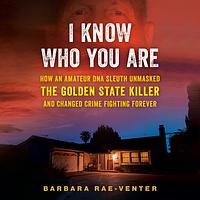Take a photo of a barcode or cover
dark
informative
medium-paced
The author weaves a wonderful picture of the cases she works on and how they are solved through science- when she writes about them. There are anecdotal stories that are utilized to try and tie a lesson and comparison into her work, but they are rather cumbersome.
Moderate: Sexual assault, Murder
challenging
dark
informative
medium-paced
emotional
informative
inspiring
fast-paced
I enjoyed learning about how the author generously volunteered to do genetic research to find missing family members, and eventually became involved in criminal investigations. The cover of the book is a bit misleading because the Golden State Killer was not the only investigation that she contributed too.
I did learn a lot about Investigative Genetic Genealogy! I think I'm more of a visual person and would have liked to have a visual aid to go along with all of the family tree description. It's a deep dive into how it all works, and I've already recommended it to a geneaologist, but it's not for someone brand new to the true crime genre.
to start, the title is clearly something the publishers came up with the hook readers-- this is a book that does talk about the golden state killer, but that is just one of the many stories in there. it is a book about the details of the start of genetic genealogy and how it is used in a forensic setting, specifically related to the author's work on several unsolved cases. now, i happen to love this because i am a total nerd for genetic science and for genealogical research. this is probably not a book for everyone, but if you happen to fall in the niche of enjoying genealogy, details of genetics, and true crime solving, i highly recommend. all said, i really enjoyed it.
emotional
informative
reflective
fast-paced
challenging
dark
informative
medium-paced
I listened to I'll Be Gone in the Dark by Michelle McNamara a few years ago, not realizing that the Golden State Killer hadn't been caught at the time that book was published. That was an excellent book and I highly recommend it if you're a fan of true crime. It goes into quite a bit of detail about the gruesome murders and rapes though.
I wanted to fill in the last few steps that led to this horrible serial killer finally getting caught so I picked up I Know Who You Are.
Ms. Rae-Venter wisely chooses not to cover ground that Ms. McNamara had covered so well in her book and focuses instead on her own part of the story. It is absolutely amazing to me that she and her team tracked down this man who had evaded capture for 40-some years in 63 days. Days. She is quick to point out that the officers, medical examiners, forensics workers, and others kept this cold case alive and laid the groundwork for his eventual identification and prosecution. She just happened to be in the right place with the right skills at a time when technology finally provided the tools to track this man down.
She describes some of his crimes a bit, so this book still isn't for the faint-hearted.
There's only so much she could write about her role in finding the Golden State Killer though and it was not enough to fill a book. She decided to write about the first criminal case she solved as a volunteer investigative genetic genealogist. A detective asked her if she could help a 30ish-year-old woman who was abducted as a child and who had no idea where she came from. Ms. Rae-Venter not only tracked down her identity, but also helped an adopted man find his birth family in the process, and identified a different serial killer. She wrote about that serial killer and a few of her other complex criminal cases as well.
I am generally more oriented toward words than visuals (give me a step-by-step description of how to do something with a picture or two and I am much happier than I am watching a YouTube tutorial), but I have to admit that I wish there were some graphics. I followed along well for the most part but the last case she details is so complex, I don't really have any idea how she found the guy. I don't know how practical this would have been but some basic family trees and the relevant branches would have been a lot of help, even with generic names like "Grandparent 1." Readers who rely on visuals more than I do may struggle.
She alludes several times to the ethics of using someone's DNA on a genealogy site to solve a criminal case. She doesn't really dig into that topic until the last chapter and even then she doesn't have a lot to say. To her, the ends mostly seem to justify the means. And when you're looking at a notorious case like the Golden State Killer, I have to agree. But where is the line? She writes about how privacy policies on family history sites have changed, making her work harder, but granting more privacy to their users. This topic could (and probably does) fill a book on its own. I'm glad she included it but part of me wishes there had been a more in-depth discussion. That isn't her purpose in writing this book though.
This is an excellent follow-up to I'll Be Gone in the Dark and an interesting look at investigative genetic genealogy. True crime fans should definitely give it a try. I can even see it being a good fit for the right book club. I feel that it could lead to some fascinating discussions.
I wanted to fill in the last few steps that led to this horrible serial killer finally getting caught so I picked up I Know Who You Are.
Ms. Rae-Venter wisely chooses not to cover ground that Ms. McNamara had covered so well in her book and focuses instead on her own part of the story. It is absolutely amazing to me that she and her team tracked down this man who had evaded capture for 40-some years in 63 days. Days. She is quick to point out that the officers, medical examiners, forensics workers, and others kept this cold case alive and laid the groundwork for his eventual identification and prosecution. She just happened to be in the right place with the right skills at a time when technology finally provided the tools to track this man down.
She describes some of his crimes a bit, so this book still isn't for the faint-hearted.
There's only so much she could write about her role in finding the Golden State Killer though and it was not enough to fill a book. She decided to write about the first criminal case she solved as a volunteer investigative genetic genealogist. A detective asked her if she could help a 30ish-year-old woman who was abducted as a child and who had no idea where she came from. Ms. Rae-Venter not only tracked down her identity, but also helped an adopted man find his birth family in the process, and identified a different serial killer. She wrote about that serial killer and a few of her other complex criminal cases as well.
I am generally more oriented toward words than visuals (give me a step-by-step description of how to do something with a picture or two and I am much happier than I am watching a YouTube tutorial), but I have to admit that I wish there were some graphics. I followed along well for the most part but the last case she details is so complex, I don't really have any idea how she found the guy. I don't know how practical this would have been but some basic family trees and the relevant branches would have been a lot of help, even with generic names like "Grandparent 1." Readers who rely on visuals more than I do may struggle.
She alludes several times to the ethics of using someone's DNA on a genealogy site to solve a criminal case. She doesn't really dig into that topic until the last chapter and even then she doesn't have a lot to say. To her, the ends mostly seem to justify the means. And when you're looking at a notorious case like the Golden State Killer, I have to agree. But where is the line? She writes about how privacy policies on family history sites have changed, making her work harder, but granting more privacy to their users. This topic could (and probably does) fill a book on its own. I'm glad she included it but part of me wishes there had been a more in-depth discussion. That isn't her purpose in writing this book though.
This is an excellent follow-up to I'll Be Gone in the Dark and an interesting look at investigative genetic genealogy. True crime fans should definitely give it a try. I can even see it being a good fit for the right book club. I feel that it could lead to some fascinating discussions.
Mycket intressant bok om hur släktforskning och dna-testning kan lösa kalla fall.




